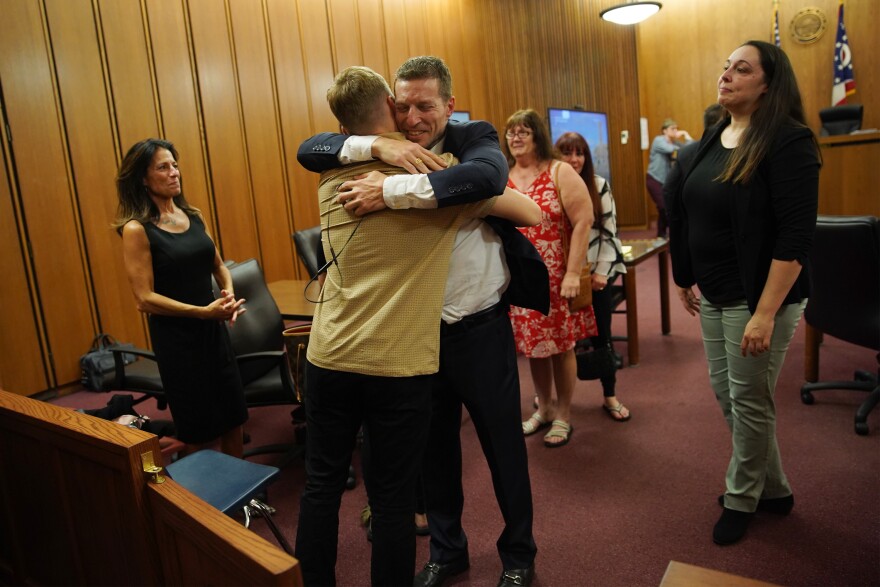A Cuyahoga County jury needed less than two hours of deliberation to reach a not guilty verdict in the retrial of Michael Buehner, whose 2002 murder conviction was overturned by an appeals court in 2021.
After the verdict was read by Judge William Vodrey, some of Buehner’s family members in attendance cried and others applauded the jury.
“I want to say it was bittersweet, just because it was so late,” Buehner said about the not guilty verdict. He spent 20 years in prison for the 2001 killing of Jerry Saunders at a home on Marah Avenue.
Buehner asked for a new trial 2014 because he said the state did not turn over witness statements to the defense that supported his innocence. His conviction was overturned in 2021, and he was released on bail in 2022 to await retrial.
At least two witnesses who lived near where Saunders was killed gave statements to police that were not turned over before the first trial.
One of those witnesses, Debbie Powell, testified during the retrial that she looked out the window and saw a Black man kill Saunders.
“She’s not getting anything out of this,” said Buehner’s attorney, Russell Randazzo, about Powell. “She’s not going to ID someone she knows is innocent.”
The state’s case, both in 2002 and in the retrial, relied primarily on two eyewitnesses who both signed affidavits recanting the testimony used to convict Buehner.
One witness, Randy Price, originally testified that he was driving Buehner’s black pickup truck early in the morning of May 24, 2001, when Buehner shot and killed Saunders while attempting to buy drugs.
The other witness, Lawone Edwards, originally testified he was with Saunders when he was killed. But Edwards could not pick Buehner out of a lineup following the murder. And testified in the retrial that he only picked Buehner out of a second lineup, months later, because he felt pressured by the police.
Price testified that he lied in the affidavit under pressure from Buehner’s attorney.
During his closing arguments, Randazzo said Price had a clear motive to testify against Buehner.
“Randy Price came in and plead to involuntary manslaughter to make sure he was not subject to the death penalty,” Randazzo said.
Price’s plea deal with the prosecution in 2002 led to a 3-year sentence.
The case against Buehner lacked physical evidence. No gun was found. Three black trucks were identified as potentially involved, including one owned by Buehner, but none were processed for fingerprints, DNA or other trace evidence. One of those three trucks was destroyed by the Cleveland Division of Police before the first trial. Several pieces of clothing worn by Saunders the night he was killed were lost or destroyed.
“There is not a shred of physical evidence linking our client to this crime,” Randazzo said.
Buehner said he was hurt to hear the prosecutor refer to him as a murderer during closing arguments this week.
“Just shocking to believe that after all this time, after all the new evidence, after all that has happened, that they still believe it was me,” Buehner said.



